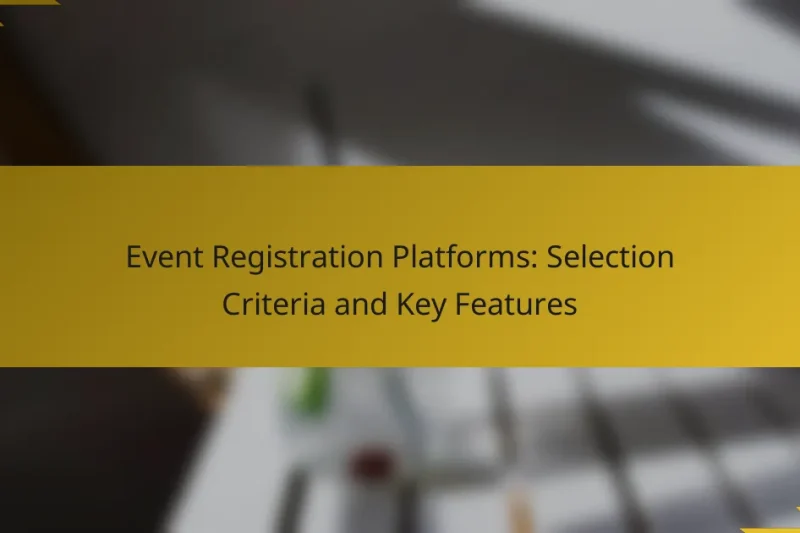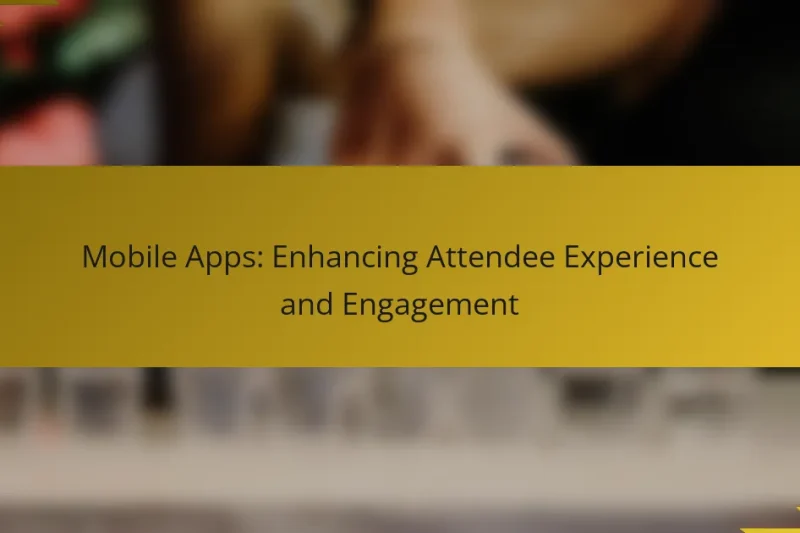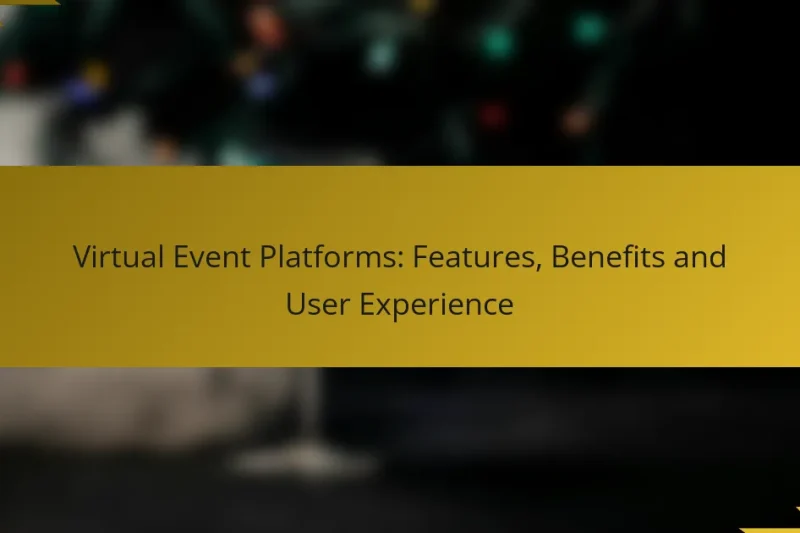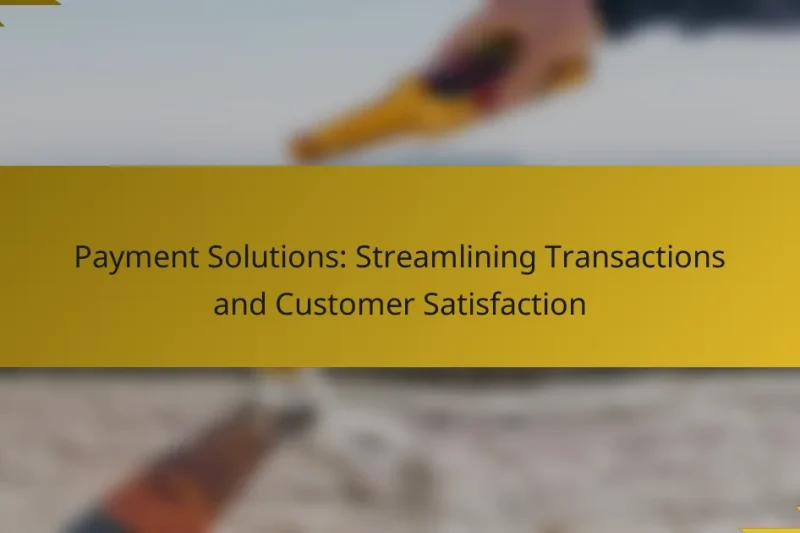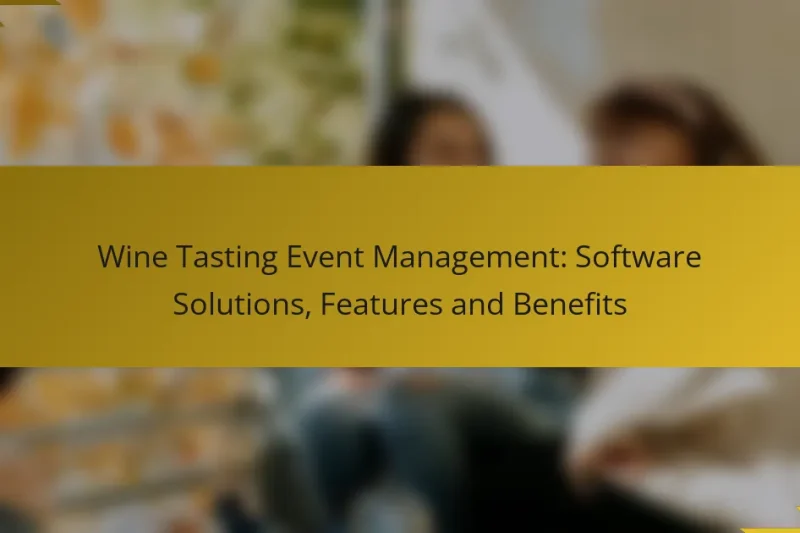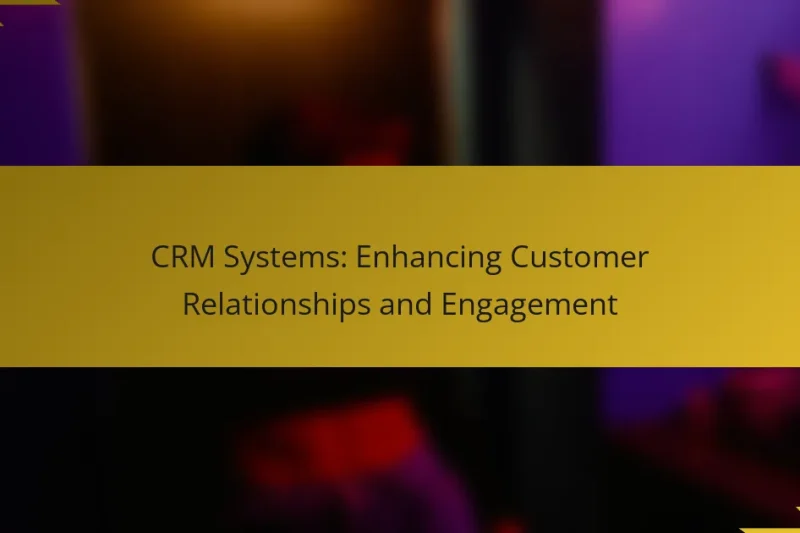Choosing the right event registration platform is crucial for effectively managing attendees and ensuring a smooth … Event Registration Platforms: Selection Criteria and Key FeaturesRead more
Event Management Technology Tools
Event management technology tools are essential for streamlining the planning, execution, and analysis of events. By automating tasks and enhancing attendee engagement, these tools not only improve efficiency but also provide valuable insights for future events. When choosing software, it’s important to focus on features that enhance both planning efficiency and the overall attendee experience.
Mobile Apps: Enhancing Attendee Experience and Engagement
Mobile apps are transforming the way attendees engage with events by offering interactive features that promote … Mobile Apps: Enhancing Attendee Experience and EngagementRead more
Virtual Event Platforms: Features, Benefits and User Experience
As organizations increasingly turn to digital solutions, virtual event platforms have emerged as essential tools for … Virtual Event Platforms: Features, Benefits and User ExperienceRead more
Payment Solutions: Streamlining Transactions and Customer Satisfaction
Effective payment solutions are essential for businesses aiming to streamline transactions and boost customer satisfaction. By … Payment Solutions: Streamlining Transactions and Customer SatisfactionRead more
Wine Tasting Event Management: Software Solutions, Features and Benefits
Effective wine tasting event management software is essential for streamlining ticket sales, guest management, and event … Wine Tasting Event Management: Software Solutions, Features and BenefitsRead more
CRM Systems: Enhancing Customer Relationships and Engagement
CRM systems play a crucial role in enhancing customer relationships by centralizing data and enabling personalized … CRM Systems: Enhancing Customer Relationships and EngagementRead more
Analytics Tools: Measuring Success and Insights for Wine Events
Analytics tools play a crucial role in enhancing the success of wine events by offering valuable … Analytics Tools: Measuring Success and Insights for Wine EventsRead more
What are the best event management technology tools?
The best event management technology tools streamline planning, execution, and analysis of events. They enhance attendee engagement, simplify logistics, and provide valuable insights for future events.
Eventbrite
Eventbrite is a popular platform for creating, promoting, and managing events of all sizes. It offers features such as ticketing, registration, and promotional tools that help organizers reach a wider audience.
With its user-friendly interface, Eventbrite allows you to customize event pages and track sales in real-time. It integrates with various social media platforms, making it easy to share events and boost attendance.
Cvent
Cvent is a comprehensive event management solution designed for larger organizations and complex events. It provides tools for venue selection, event registration, and attendee management, along with robust reporting features.
Consider Cvent if you require advanced features like budget management and detailed analytics. Its scalability makes it suitable for corporate events, conferences, and trade shows, ensuring a professional experience.
Asana
Asana is a project management tool that can be effectively used for event planning. It allows teams to collaborate, assign tasks, and track progress in a centralized platform, ensuring that all aspects of the event are covered.
Utilize Asana to create timelines, set deadlines, and manage workflows. Its flexibility makes it suitable for both small gatherings and large conferences, helping teams stay organized and on schedule.
Whova
Whova is an event management app that enhances attendee engagement through features like networking, agenda management, and live polling. It is especially useful for conferences and trade shows, where interaction is key.
With Whova, attendees can connect with each other, access event materials, and provide feedback in real-time. This tool helps create a more interactive and memorable experience for participants.
Meetup
Meetup is designed for organizing local events and building communities around shared interests. It enables users to create groups, schedule events, and communicate with members effectively.
Utilize Meetup for informal gatherings, workshops, or networking events. Its focus on local engagement makes it an excellent choice for connecting with people in your area and fostering community involvement.
How do event management tools improve efficiency?
Event management tools enhance efficiency by automating various tasks, reducing manual work, and streamlining processes. This leads to quicker planning, better resource allocation, and improved attendee experiences.
Streamlined registration processes
Streamlined registration processes allow event organizers to manage attendee sign-ups with ease. Online registration forms can be customized to collect necessary information efficiently, reducing the time spent on data entry.
Consider using tools that offer features like group registrations and payment processing. This can significantly decrease the time from registration to confirmation, often completing the process in just a few minutes.
Automated communication
Automated communication tools facilitate timely interactions with attendees, ensuring they receive important updates without manual effort. Automated emails can confirm registrations, send reminders, and provide event details, enhancing attendee engagement.
Utilizing a platform that integrates with messaging apps can further streamline communications. For instance, sending SMS updates can reach attendees instantly, improving their overall experience.
Real-time analytics
Real-time analytics provide event organizers with immediate insights into attendee behavior and engagement. This data helps in making informed decisions quickly, such as adjusting marketing strategies or reallocating resources during the event.
Look for tools that offer dashboards displaying key metrics like registration numbers, ticket sales, and attendee demographics. This information can guide adjustments that enhance the event’s success while it is still ongoing.
What features should you look for in event management software?
When selecting event management software, prioritize features that enhance planning efficiency and attendee experience. Key functionalities include budget management, engagement tools, and customizable templates, which collectively streamline the event process and improve participant satisfaction.
Budget management tools
Effective budget management tools help track expenses and revenues throughout the event lifecycle. Look for software that allows you to set budgets, monitor spending in real-time, and generate financial reports to ensure you stay within your limits.
Consider features like cost forecasting and vendor management, which can help you make informed financial decisions. A good tool should also provide alerts for budget overruns, allowing you to adjust plans proactively.
Attendee engagement features
Attendee engagement features are crucial for enhancing participant interaction and satisfaction. Look for tools that offer live polling, Q&A sessions, and networking opportunities, which can significantly boost attendee involvement during the event.
Additionally, consider platforms that provide personalized agendas and push notifications to keep attendees informed and engaged. These features can lead to higher satisfaction rates and better overall experiences.
Customizable templates
Customizable templates allow you to create event materials that reflect your brand and meet specific needs. Look for software that offers a variety of templates for invitations, schedules, and promotional materials, which can save time and ensure consistency.
Ensure that the templates are easy to modify, allowing you to adjust colors, logos, and content without needing extensive design skills. This flexibility can enhance your event’s professionalism and appeal to your target audience.
How do subscription models work for event management tools?
Subscription models for event management tools typically involve recurring payments for access to software features and services. Users can choose from various pricing plans that may include different levels of functionality, support, and user limits.
Monthly vs annual pricing
Monthly pricing allows users to pay for event management tools on a month-to-month basis, which can be beneficial for those with short-term needs or uncertain budgets. However, annual pricing often comes with discounts, making it a more cost-effective option for organizations planning multiple events throughout the year.
For example, a tool might charge $50 per month or offer an annual plan for $500, effectively providing two months free. Organizations should evaluate their event schedules and cash flow to determine the best payment structure.
Tiered service levels
Tiered service levels in subscription models provide users with options based on their specific needs and budget. Basic tiers usually include essential features, while higher tiers offer advanced functionalities like analytics, integrations, and premium support.
For instance, a basic plan might allow for up to 100 attendees and limited reporting, while a premium plan could accommodate unlimited attendees and provide in-depth insights. Organizations should assess their requirements and choose a tier that aligns with their event goals to avoid overpaying for unnecessary features.
What are the top event management tools for small businesses?
The top event management tools for small businesses include platforms that streamline planning, registration, and promotion. These tools help manage logistics efficiently, allowing businesses to focus on delivering a successful event.
Eventbrite
Eventbrite is a widely used platform that allows small businesses to create, promote, and manage events easily. It offers features such as customizable event pages, ticketing options, and analytics to track attendance and sales.
When using Eventbrite, consider its pricing structure, which typically includes a fee per ticket sold. This can be manageable for small events but may add up for larger gatherings. Additionally, its integration with social media can enhance your event’s visibility.
Meetup
Meetup is designed for organizing community events and connecting people with similar interests. It allows businesses to create groups and schedule events, making it easier to build a local audience.
For small businesses, Meetup can be a cost-effective way to engage with potential customers. However, it’s essential to actively promote your events within the platform and engage with attendees to maximize participation.
Whova
Whova is an all-in-one event management solution that focuses on enhancing attendee engagement. It provides tools for registration, agenda management, and networking opportunities through its mobile app.
Using Whova can significantly improve the attendee experience, but it may require a learning curve for both organizers and participants. Small businesses should weigh the benefits of its comprehensive features against the potential complexity of setup and use.
